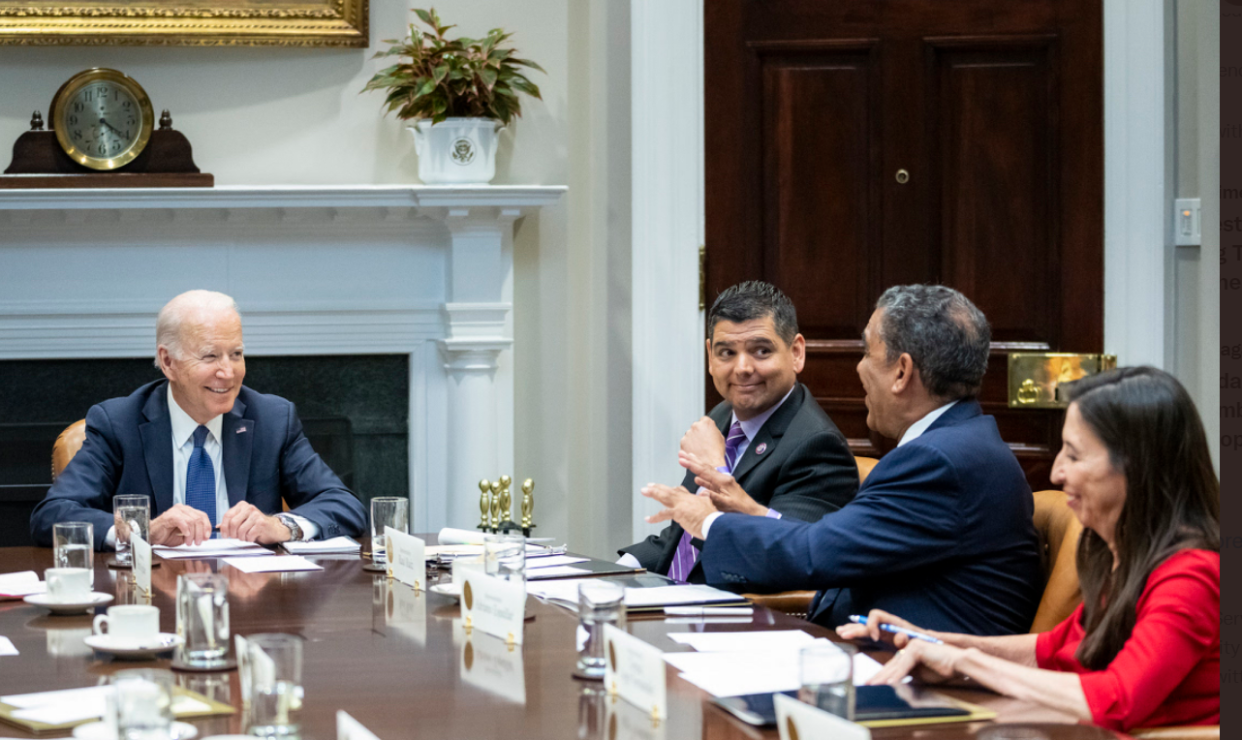Ruiz, Hispanic Caucus discuss immigration reform with Biden as Title 42 hangs in balance

- Oops!Something went wrong.Please try again later.
With President Joe Biden looking to roll back a pandemic-era emergency order along the southern U.S. border, Rep. Raul Ruiz, D-La Quinta, and others from the Congressional Hispanic Caucus met with White House officials this week to encourage the president to keep his plan in place to overturn the policy.
Their discussion covered a wide range of issues, including equitable distribution of infrastructure funds and alleviating student debt, but one of the most pressing topics was the fate of Title 42, a pandemic-era policy implemented under former President Donald Trump that has allowed U.S. officials to expel tens of thousands of migrants at the southern border as a public health measure.
In early April, the federal government announced its plans to lift the order by late May, drawing the ire of many Republican lawmakers and a few Democrats.
Despite some pushback — and a report from Axios last week that Biden has discussed delaying the Title 42 repeal — Ruiz said during the meeting with the Congressional Hispanic Caucus on Monday that the president and White House officials maintained they plan to revoke the order.
“The president was committed to lifting the policy,” said Ruiz, who chairs the caucus. “The Congressional Hispanic Caucus believes that Title 42 is a public health emergency policy — it is not border management policy. The science should speak for itself.”
"The point is that Title 42 denies the legal right for asylum seekers and refugees to due process in our country," he added. "Those are American laws that are based on international norms and agreements."
However, the fate of Title 42 became murkier this week when a federal judge said he would temporarily block the Biden administration’s plans to phase out the Title 42 restrictions ahead of May 23. Ruiz said he learned of the judge’s decision as he departed from the meeting Monday.
“We're still waiting to fully understand the extent of the pause, but I do believe that the administration will pursue lifting Title 42,” Ruiz said.
The judge's ruling means the rule may not be revoked until after May 23, according to Esther Sung, legal director for the Justice Action Center, a coalition that offers legal resources to immigrant communities.
"It seems very uncertain that May 23 will arrive without at least one court order enjoining the CDC order from taking effect," Sung said in an email.
'Remain in Mexico' policy also under examination
The fate of Title 42 is not the only immigration policy that could be overturned soon. This week, the Supreme Court has discussed whether the Biden administration can end the Trump-era "Remain in Mexico" policy, in which federal officials can send asylum seekers from Central America back to Mexico during their immigration proceedings.
Ruiz argued the existing case backlog at the border is in part due to the "Remain in Mexico" policy, pointing to Biden recently doubling the budget for the immigration court system as a potential remedy.
Although several caucus members attended the White House meeting, lawmakers’ views on Title 42 are mixed, with many pointing to projections that thousands of additional people will seek refuge in the U.S. if the policy is lifted.
Rep. Henry Cuellar, a Democratic member of the caucus from Texas, said in a recent interview that the White House is “listening to the immigration activists” on the issue, and asked: “Who’s listening to the border communities, the sheriffs, the landowners, the rest of the people that live on the border?”

But Ruiz pointed to House Democrats’ support of recent immigration bills providing pathways to citizenship for people without documentation as evidence of the party’s unity on the issue. The congressman also argued immigration reform will boost the country’s GDP, raise salaries and make Medicare and Social Security more solvent.
“That's the key message, and that's in contrast to the ... anti-immigrant hate and fear, dehumanizing rhetoric (from Trump and the GOP) that brings out the worst in society, scapegoating and criminalizing women and children who are fleeing for their lives,” Ruiz said.
Biden’s plans to revoke Title 42 drew swift condemnation from most congressional Republicans, including Rep. Ken Calvert, R-Corona, who said in early April that the decision "will only make a bad situation worse.”
“By ending the enforcement of Title 42, President Biden is once again encouraging illegal immigration across our border and placing an unbearable burden on our federal law enforcement officers,” said Calvert, who is seeking re-election in a new district that includes parts of the western Coachella Valley.
'Immigration has been a wedge issue always'

With members of Congress from both parties pushing back on Biden’s proposal, the topic of immigration will likely be in the spotlight again in this year’s midterm elections, though its primacy won’t be anything new, according to experts.
“Immigration has been a wedge issue always, especially in recent years, when it comes to the election cycle, so it's not a surprise,” said Connie Choi, policy director for the California Immigrant Policy Center (CPIC).
With federal laws and regulations prohibiting people without documentation from many benefit programs, Choi said her team has focused on how state-level action can fill in those gaps.
For example, one bill with CPIC's support, and sponsored by Assemblymember Eduardo Garcia, D-Coachella, would provide money to workers who have lost their job and been excluded from unemployment benefits due to their immigration status. That bill has been passed by an Assembly committee and awaits another vote.
In the meantime, Choi said immigration officials in California have been "continuing to wait" on immigration reform at the federal level.
"I cannot surmise or predict ahead in terms of what the impacts of this Title 42 conversation will be, but I am clear, as somebody who has worked within the immigrant rights movement for several years, that immigration will just come up again, right, as an issue during the midterm elections," Choi added. "We'll see what that looks like."
Tom Coulter covers politics and can be reached at thomas.coulter@desertsun.com.
This article originally appeared on Palm Springs Desert Sun: Ruiz, Hispanic caucus talk immigration reform, Title 42 with Biden

